« Facione 1990 » : différence entre les versions
(Page créée avec « Catégorie:livre <!-- La catégorie livre est une sous-catégorie de référence. Elle inclut les ouvrages publiés chez un éditeur. Les rapports, thèses et mémoires ... ») |
|||
| Ligne 65 : | Ligne 65 : | ||
<!-- Entrer ici un résumé personnel du livre (facultatif) --> | <!-- Entrer ici un résumé personnel du livre (facultatif) --> | ||
Un résumé exécutif est disponible ici : https://www.insightassessment.com/Resources/Importance-of-Critical-Thinking/Expert-Consensus-on-Critical-Thinking/Delphi-Consensus-Report-Executive-Summary-PDF | |||
La liste des capacités identifées par les experts : | |||
[[Fichier:Facione_1990_Skills]] | |||
La liste des dispositions identifées par les experts : | |||
[[Fichier:Facione_1990_Dispositions]] | |||
<br> | <br> | ||
== 7. Voir aussi == | == 7. Voir aussi == | ||
<br> | <br> | ||
<br> | <br> | ||
Version du 11 novembre 2018 à 19:20
Critical Thinking: A Statement of Expert Consensus for Purposes of Educational Assessment and Instruction. Research Findings and Recommendations
1. Références
- Référence complète APA : Facione, P. (1990). Critical Thinking: A Statement of Expert Consensus for Purposes of Educational Assessment and Instruction. Research Findings and Recommendations. Prepared for the Comitee on Pre-College Philosophy of the American Philosophical Asociation.
- Auteur(s) :
2. Copies
- Copie électronique en ligne : https://files.eric.ed.gov/fulltext/ED315423.pdf
- Copie électronique locale : Fichier:Facione 1990.pdf
- Copie physique CP :
- Copie physique en bibliothèque :
3. Mots-clés
4. Quart de couverture
Using a qualitative research methodology, known as the Delphi Method, an interactive panel of experts was convened to work toward a consensus on the role of critical thinking (CT) in educational assessment and instruction. In Delphi research, experts participate in several rounds of questions that require thoughtful and detailed responses. Panelists work toward consensus by sharing reasoned opinions and reconsidering the opinions with regard to comments, objections, and arguments offered by other experts. A total of 46 scholars, educators, and leading figures in CT theory and CT assessment research were gathered for the panel meetings. About half of the panelists were primarily affiliated with philosophy departments; the others were affiliated with education, social sciences, or physical sciences. Recommendations resulting from the discussion rounds address the cognitive skill dimension of CT, the dispositional dimension of CT, and specific recommendations on CT instruction and assessment, including development of a CT curriculum. A discussion of commercially available CT assessment tools, a bibliography with an emphasis on assessment, and a set of letters which chronicle the progress of the Delphi research group are appended. (TJH)
5. Table des matières (facultatif)
6. Résumé personnel (facultatif)
Un résumé exécutif est disponible ici : https://www.insightassessment.com/Resources/Importance-of-Critical-Thinking/Expert-Consensus-on-Critical-Thinking/Delphi-Consensus-Report-Executive-Summary-PDF
La liste des capacités identifées par les experts : Fichier:Facione 1990 Skills
La liste des dispositions identifées par les experts :
Fichier:Facione 1990 Dispositions
7. Voir aussi
